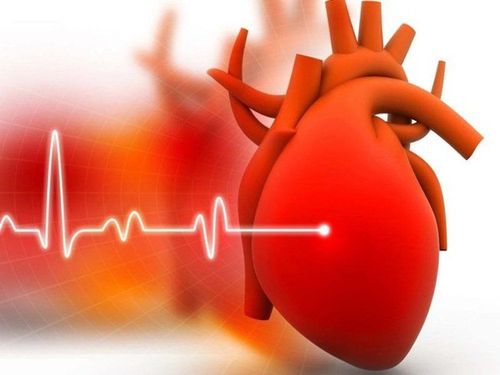This is an automatically translated article.
The article was professionally consulted by a doctor at Cardiology Center - Vinmec Central Park International General Hospital.Pericarditis is the "bulging" and irritation of the pericardium (the thin membrane that surrounds the outer surface of the heart). Pericarditis usually causes chest pain and sometimes other unpleasant symptoms. Severe chest pain from pericarditis may be due to a torn pericardium.
Pericarditis often appears suddenly but does not last long, when symptoms persist, it has turned into a chronic stage. Most pericarditis is mild and improves on its own, and treatment of severe cases often requires medication and sometimes surgery (although very rarely). Early diagnosis and treatment of pericarditis can reduce disease-related events/complications.
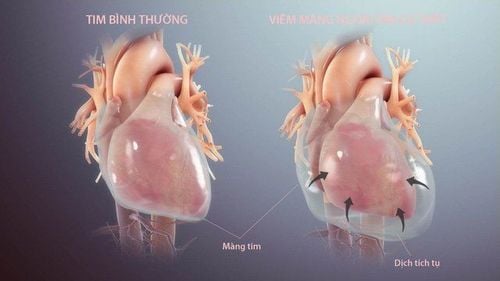
Tình trạng viêm màng ngoài tim
1. Symptoms of pericarditis
Pericarditis is classified into several types, depending on symptoms and duration of symptoms. Acute pericarditis is defined as duration less than 3 weeks. Subacute pericarditis lasts 4-6 weeks but less than 3 months.
Recurrent pericarditis occurs about 4-6 weeks after the exacerbation with no symptoms between episodes. Chronic pericarditis when lasting more than 3 months. If the patient has acute pericarditis, pain may spread to the left shoulder and neck, characterized by increased pain when coughing, lying down, or taking a deep breath. Sitting up and leaning forward will reduce the pain. It is sometimes difficult to distinguish chest pain from acute pericarditis or chest pain from myocardial infarction.
Some signs and symptoms of pericarditis:
Severe chest pain in the middle of the chest or left chest, which increases when inhaling Difficulty breathing when lying down Anxiety Low fever Feeling weak, tired, sluggish Cough Swollen legs or ascites See a doctor when:
New chest pain or worsening symptoms Many of the symptoms of pericarditis closely resemble those of other heart and lung conditions. The sooner you see the doctor, the sooner you can be diagnosed and treated. For example, although you have chest pain due to pericarditis, this chest pain could be the beginning of a heart attack or the beginning of a pulmonary embolism due to a blood clot.
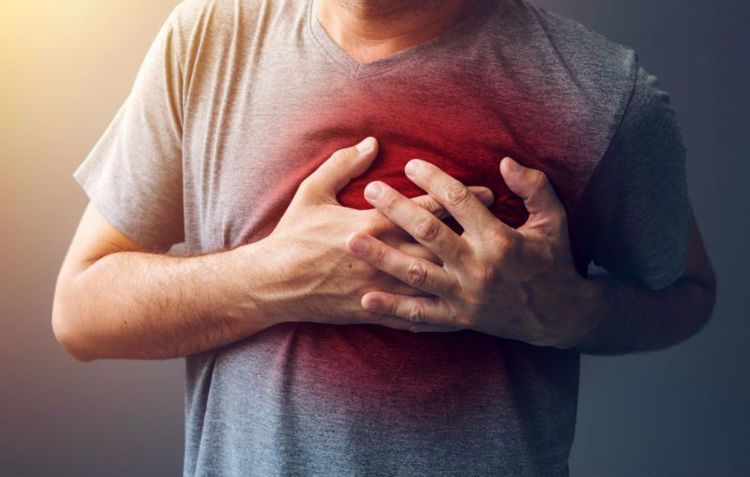
Người bệnh đau ngực dữ dội
2. Causes of pericarditis
Normally, the two layers of the pericardium slide over each other because in the middle there is a thin layer of smooth fluid. When you have pericarditis, this lining is irritated by an inflammatory response that causes chest pain. Often the cause of pericarditis cannot be determined, making it difficult to determine whether it is idiopathic or viral infection.
Pericarditis often occurs after an acute myocardial infarction or after cardiac surgery. Dressler syndrome is the name to refer to the inflammation of the pericardium after heart surgery, after myocardial infarction and after heart damage.
Other causes include:
Systemic disease (autoimmune): lupus, rheumatoid arthritis,.. Trauma: after traffic accident Other diseases: kidney failure, AIDS, tuberculosis or cancer Drug-induced
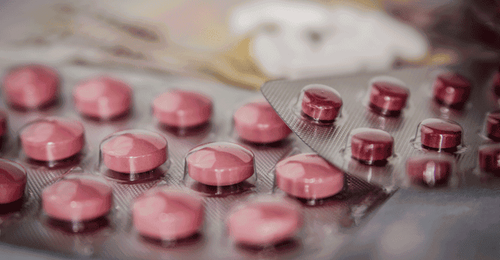
Một số loại thuốc có thể là nguyên nhân gây bệnh
3. Complications of pericarditis
Limited pericarditis: In some cases of prolonged, recurrent or chronic pericarditis, the pericardium is permanently damaged, thickened, scarred and limited the elasticity of the left heart. Cardiac failure, loss of elasticity will make the heart work inefficiently, causing limited pericarditis, leg edema, ascites, and shortness of breath.
Cardiac tamponade: When there is too much fluid in the pericardial cavity, compression occurs causing hypotension and can be fatal if not treated promptly.
4. Diagnosis of pericarditis
The doctor will ask for a history of chest pain and other symptoms. A physical examination will then be performed, including auscultation of the heart. Then the doctor will do tests to confirm diagnosis and differentiate it from other diseases such as myocardial infarction,...
Electrocardiogram X-ray cardiopulmonary echocardiogram CT (if necessary) ) MRI (diagnosis of pericardial pathology)
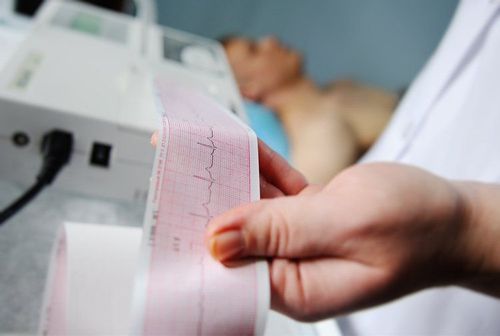
Điện tâm đồ giúp chẩn đoán viêm màng ngoài tim
5. Treatment of pericarditis
Depending on the cause and severity of the disease, the doctor will prescribe an appropriate treatment regimen:
Medicines: Targets to reduce inflammation and reduce edema:
Pain relief: Aspirin, Ibuprofen, .. Colchicine: Reduce symptoms existing and reduce symptoms of recurrence. However, the drug has side effects, consider with the doctor's opinion. Corticosteroids: as prescribed by the doctor If the pericarditis is caused by bacteria, antibiotics and drainage if necessary.
Hospitalization and procedures: B will be admitted to the hospital if the patient has cardiac tamponade, or has other dangerous complications caused by the fluid layer.
Management of acute cardiac tamponade:
Pericardial drainage: The procedure is performed with a needle and small drain to drain fluid from the pericardial cavity. The procedure was performed in a sterile operating room and the patient required hospitalization. Open surgery: When diagnosing restrictive pericarditis, helps relieve the pressure of the pericardium on the heart, restoring elasticity to help the heart work efficiently.

Điều trị viêm màng ngoài tim bằng phương pháp mổ hở
Some advice:
Limit physical activity because exercise can make symptoms worse. Follow the advice of a specialist. To protect heart health in general and detect early signs of myocardial infarction and stroke, customers can sign up for the Cardiovascular Screening Package - Basic Cardiovascular Examination of Vinmec International General Hospital. The examination package helps to detect cardiovascular problems at the earliest through tests and modern imaging methods. The package is for all ages, genders and is especially essential for people with risk factors for cardiovascular disease.
To register for examination and treatment at Vinmec International General Hospital, you can contact Vinmec Health System nationwide, or register online HERE
References:
Pathology of Inflammation Pericarditis - teaching materials Department of Internal Medicine - University of Medicine and Pharmacy, Ho Chi Minh City Braunwald's Heart Disease edition 11- Pericarditis Mayo Clinic website- Pericarditis
SEE MORE
How many types of valvular heart disease are there? Is mitral regurgitation dangerous? Possible complications after heart valve replacement








